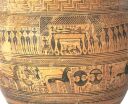|
Weeping Woman

 


Funeral
urns marked the graves of notable warriors like Agamemnon. Mourners could
offer wine to a departed shade, wine passing through soil to refresh a
distinctive voice which, for a moment, can engage the suppliant.
Foreseeing
the death of her husband, the Trojan prince Hector, Andromache rushes to
the walls to stop his exit from Troy back into battle, to stop him from
confrontation with the Greek, Achilles, to stay his fate. Hector
understands, however, that Andromache’s love depends precisely on his
willingness to face Achilles, to confront his fate, to attempt the defense
of her, their child, and Troy, all the more telling for its eventual
failure.
Here
lies Timokritos: soldier: valiant in battle.
Ares spares not the brave man, but the coward.
– Anakreon, The Greek Anthology
Death
in battle, of course, offers fame. Our funeral urn depicts a fallen
warrior, with shroud lifted, dogs below, wife and child at feet, and women
mourners tearing hair in timeless gestures of grief. Below the bier, a
procession of warriors recall the conditions and activities meriting fame.
Their warrior will enter the land of shades, where only memories of his
deeds in life can momentarily restore his features and actions. The more
particular the recollections, the more that shade will, for a time, come
back to life. Greek stories, including the Iliad, take place in the
theatre of the mind. Those who carried offerings of wine would pour their
offering through the urn, open at the bottom. Seeping into the soil, down
to the shades below, the wine might raise from the shadowy dead, the sound
of their warrior’s voice. The Iliad, recited aloud, recalls the voices
as well as the activities of the glorious dead.
Wife
and child appear at the feet of their fallen lord. Consider Hector’s
telling prediction of their fate: public death with disgrace to Astyonax,
“Lord of the City,” a potential magnet for dissident captives not to be
saved through sentimentality. Bondage to a noble killer of Trojan royalty
for his wife, Andromache. The distance between notions of justice, of divine love,
and the stages of grief common to monotheistic religions including
Christianity, are less than
apparent in this scene. Considering, among other scenes, widows of
fallen soldiers, perhaps from the Spanish civil war as well as the Trojan
War, Wallace Stevens calls attention to the powers of imagination to
endure, not through transcendence of the ego, but in accordance with harsh
fate:
Wallace
Stevens
Another
Weeping Woman
Pour the
unhappiness out
From your too bitter heart,
Which grieving will not sweeten.
Poison
grows in this dark.
It is in the water of tears
Its black blooms rise.
The
magnificent cause of being,
The imagination, the one reality
In this imagined world
Leaves
you
With him for whom no phantasy moves,
And you are pierced by a death.
Picasso's
Weeping Women


|